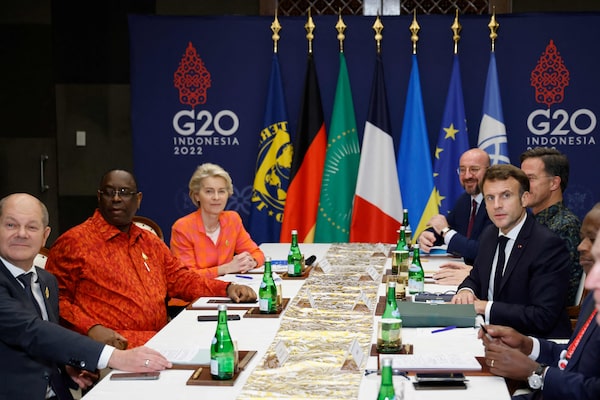
African and European leaders hold a meeting on the sidelines of the G20 Summit in Nusa Dua, Bali, on Nov. 15.LUDOVIC MARIN/AFP/Getty Images
The African Union has failed in its bid for a permanent seat at the G20, leaving Africa with only one representative at the global summit where key issues of food security and energy are shaped.
Several of the G20′s biggest agenda items – including climate change, debt relief and soaring global food prices – are issues where Africa is more vulnerable than any other region. Despite support from at least four of the summit’s member states, the African Union was unable to win a full-time seat at the G20 table this week.
In the lead-up to the summit in Indonesia, the AU had complained that Africa suffers the cost of G20 decisions without proper representation at the table. Only one African country, South Africa, is a permanent member of the group, although other African leaders are sometimes invited as guests.
“Africa is left to absorb decisions made by others, even on issues that affect its countries directly,” said the current AU chairman, Senegal President Macky Sall, in a recently published proposal for AU membership at the G20.
“The most pressing issues – climate change, pandemics, security and debt – are ones that both affect Africa and on which Africa is in a position to contribute to solutions,” he said. “Such a gap in African representation can weaken the G20′s credibility, traction and representativeness.”
At the summit this week, the AU proposal was publicly supported by the leaders of South Africa, China, Indonesia and France. But it was not mentioned anywhere in the 17-page declaration issued by the G20 leaders at the end of their summit in Bali on Wednesday.
A Western diplomat told The Globe and Mail that the AU proposal for full-time G20 membership had not been on the summit’s agenda and there was no substantive discussion of it. The Globe is not naming the official because the official was not authorized to comment to the media.
French President Emmanuel Macron said he told the summit that he supports the “full and complete integration of the African Union into the G20.”
He noted that the European Union is already a G20 member. So, too, are several European and North American countries.
“If we want to express real solidarity with the South, we must accept that the African Union, like the European Union, comes to the table,” Mr. Macron told a news conference on Wednesday.
The South African government said before the summit that it would push for AU membership of the G20. “It’s important that the collective voice of the continent is represented within that platform,” said Vincent Magwenya, a spokesperson for President Cyril Ramaphosa, at a press briefing last Sunday.
Mr. Ramaphosa’s office tweeted on Tuesday that he had lobbied for AU membership during the G20′s working session on food and energy security.
The Chinese government, in a statement this week, said President Xi Jinping was the first to publicly support the AU bid to join the G20. It said he had reiterated this support at a meeting with Mr. Sall during the summit on Tuesday.
Before the summit, Mr. Sall had said that he expected the G20 to approve the AU proposal. There was no clear statement from any G20 official about why the proposal was not endorsed.
Mr. Sall, in his advocacy for AU membership, had argued that the African continent has a population of 1.4 billion, roughly as big as China or India. “Combined, the African countries would be the world’s eighth-largest economy,” he said in the proposal, published on Devex, a global development platform.
“The G20 compromises its effectiveness and influence by omitting such a large fraction of humanity and the world economy,” he said.
Independent experts have made similar arguments. “With only South Africa as a member, Africa remains severely under-represented in the G20 and the continent is often seen as a subject rather than an agent,” a report by the Africa-based Institute for Security Studies (ISS) concluded last year.
Liesl Louw-Vaudran, a senior researcher at the ISS, said the support for AU membership from countries such as China and France is a significant shift, despite the lack of approval from the full group. It is a recognition of Africa’s growing strategic importance and its political clout at the United Nations General Assembly, where it has 54 votes, she said.
“I think the tide is turning,” she told The Globe in an interview.
“The AU has come a long way. It is managing at least to push itself forward as Africa’s voice on the world stage. And it’s in the interest of developed nations and the rich nations to have Africa seated at the table, because Africa is so strategically important.”
 Geoffrey York
Geoffrey York James Griffiths
James Griffiths